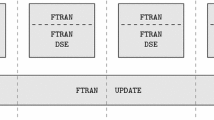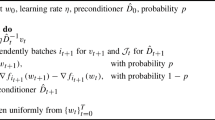Abstract
We present a numerical implementation of the parallel gradient distribution (PGD) method for the solution of large-scale unconstrained optimization problems. The proposed parallel algorithm is characterized by a parallel phase which exploits the portions of the gradient of the objective function assigned to each processor; then, a coordination phase follows which, by a synchronous interaction scheme, optimizes over the partial results obtained by the parallel phase. The parallel and coordination phases are implemented using a quasi-Newton limited-memory BFGS approach. The computational experiments, carried out on a network of UNIX workstations by using the parallel software tool PVM, show that parallelization efficiency was problem dependent and ranged between 0.15 and 8.75. For the 150 problems solved by PGD on more than one processor, 85 cases had parallelization efficiency below 1, while 65 cases had a parallelization efficiency above 1.
Similar content being viewed by others
References
MANGASARIAN, O. L., Parallel Gradient Distribution Algorithm in Unconstrained Optimization, SIAM Journal on Control and Optimization, Vol. 33, pp. 1916–1925, 1995.
BERTSEKAS, D. P., and TSITSIKLIS, J. N., Parallel and Distributed Computation, Prentice-Hall, Englewood Cliffs, New Jersey, 1989.
FERRIS, M. C., and MANGASARIAN, O. L., Parallel Variable Distribution, SIAM Journal on Optimization, Vol. 4, pp. 815–832, 1994.
FLETCHER, R., Practical Methods of Optimization, 2nd Edition, John Wiley and Sons, Chichester, England, 1987.
LIU, D. C., and NOCEDAL, J., On the Limited Memory BFGS Method for Large-Scale Optimization, Mathematical Programming, Vol. 45B, pp. 503–528, 1989.
SUNDERAM, V. S., GEIST, G. A., DONGARRA, J., and MANCHEK, R., The PVM Concurrent Computing System: Evolution, Experiences, and Trends, Parallel Computing, Vol. 20, pp. 531–545, 1994.
POLAK, E., Computational Methods in Optimization, Academic Press, New York, New York, 1971.
CONFORTI, D., GRANDINETTI, L., and MUSMANNO, R., Parallel Asynchronous Quasi-Newton Algorithm for Nonlinear Optimization Problems, Proceedings of the IMACS-IFAC International Symposium on Parallel and Distributed Computing in Engineering Systems, Edited by S. Tzafestas, P. Borne, and L. Grandinetti, Elsevier Science Publisher, Amsterdam, Netherlands, pp. 161–167, 1992.
MORÉ, J. J., GARBOW, B. S., and HILLSTROM, K. E., Testing Unconstrained Optimization Software, ACM Transaction on Mathematical Software, Vol. 7, pp. 17–41, 1981.
GRIPPO, L., LAMPARIELLO, F., and LUCIDI, S., A Truncated Newton Method with Nonmonotone Line Search for Unconstrained Optimization, Journal of Optimization Theory and Applications, Vol. 60, pp. 401–419, 1989.
Author information
Authors and Affiliations
Rights and permissions
About this article
Cite this article
Conforti, D., Musmanno, R. Parallel Algorithm for Unconstrained Optimization Based on Decomposition Techniques. Journal of Optimization Theory and Applications 95, 531–544 (1997). https://doi.org/10.1023/A:1022665620666
Issue Date:
DOI: https://doi.org/10.1023/A:1022665620666




